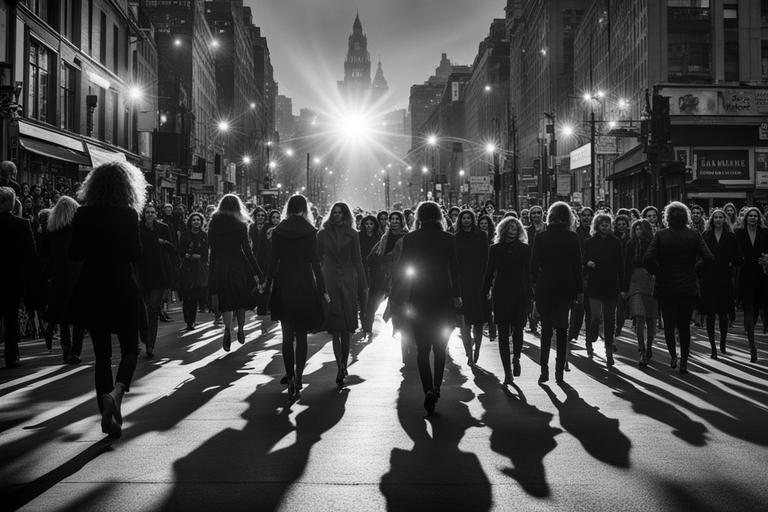The spotlight effect - a fascinating phenomenon that reveals how our perceptions of ourselves and others can be distorted by the overestimation of public attention.

Table of Contents
- Introduction
- Why Does it Happen?
- The Consequences
- Harnessing the Spotlight Effect
- Conclusion
- 🌐 Sources
Introduction
The spotlight effect is a psychological phenomenon that encapsulates the tendency of individuals to believe that they are being noticed and scrutinized by others more than they actually are. Coined by Thomas Gilovich, Victoria Medvec, and Kenneth Savitsky in 2000, the concept underscores our innate inclination to overestimate the extent to which our actions, appearance, or behavior draw attention from those around us.
This cognitive bias often leads people to feel self-conscious in social situations, as they believe that others are intensely focused on them. The spotlight effect can influence various aspects of human behavior, affecting self-esteem, social interactions, and decision-making. Understanding this phenomenon offers insights into the complexities of social perception and the ways in which individuals navigate the dynamics of public attention in their daily lives.
Why Does it Happen?
Imagine walking down a crowded street, feeling a million eyes scrutinizing your every move. A misplaced hair, an awkward stumble, a nervous laugh – all magnified by the imaginary spotlight, casting you as the star of a performance observed by an invisible audience. This, in essence, is the spotlight effect, a fascinating phenomenon that reveals how our perceptions of ourselves and others can be distorted by the overestimation of public attention.
The roots of the spotlight effect lie in our inherent social nature. We crave connection and belonging, and being the center of attention, even if imagined, activates the reward centers in our brains. This need for validation can lead us to believe that our every action, big or small, is being meticulously analyzed by others, even when reality paints a different picture.
ADVERTISEMENT
Ultimately, the spotlight effect is a reminder of the inherent duality of human nature. It not only reflects our vulnerability to social pressures and anxieties, but also our capacity for self-improvement and prosocial behavior.
The Consequences
The impact of the spotlight effect is far-reaching. It can fuel social anxiety, making us self-conscious and hesitant in public spaces. The fear of judgment and ridicule can stifle our creativity, leading us to shy away from expressing ourselves authentically. It can even distort our perception of others, making us believe they are judging us as harshly as we judge ourselves.
But the spotlight effect is not just a source of anxiety; it can also have positive consequences. The belief that others are watching can motivate us to behave in more socially desirable ways, promoting prosocial behavior and fostering cooperation within communities. It can also drive us to strive for excellence, as the imagined audience becomes a silent motivator pushing us to improve our skills and achieve our goals.
Harnessing the Spotlight Effect
The key to harnessing the power of the spotlight effect lies in understanding its limitations. Recognizing that our perceived level of public scrutiny is often inflated can be a first step towards mitigating its negative impacts. By reminding ourselves that most people are too preoccupied with their own lives to pay our every move the intense attention we imagine, we can loosen the grip of social anxiety and embrace our authentic selves with greater confidence.
Furthermore, we can leverage the positive aspects of the spotlight effect by consciously directing our attention towards positive role models and aspirational figures. Imagining ourselves under the metaphorical spotlight of those we admire can motivate us to emulate their virtues and strive towards our own personal growth.
Conclusion
Ultimately, the spotlight effect is a reminder of the inherent duality of human nature. It not only reflects our vulnerability to social pressures and anxieties, but also our capacity for self-improvement and prosocial behavior. By understanding its mechanisms and wielding its power with mindfulness, we can transform the spotlight from a source of fear to a source of motivation, stepping onto the stage of life with confidence and authenticity, knowing that the true applause lies in staying true to ourselves and contributing meaningfully to the world around us.
So, the next time you find yourself under the imaginary spotlight, remember that the intensity is often more a product of your own perception than reality. Take a deep breath, let go of the need for constant validation, and shine your light with confidence. The world needs your unique glow, not a performance tailored to an imagined audience. Embrace the spotlight not as a burden, but as an opportunity to be your best self, on your own terms, and let your true brilliance illuminate the path forward.
🌐 Sources
© 2023 digitalblackboard.io